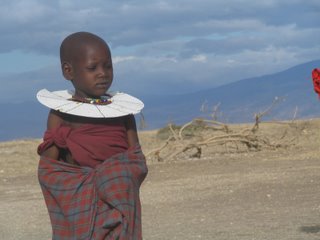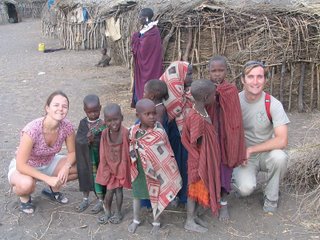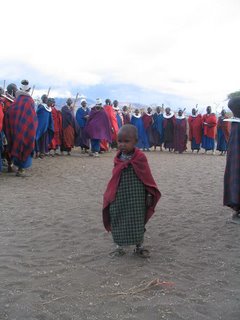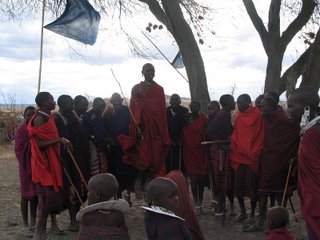The Masai




When you arrive at Kilimanjaro airport you are essentially at the start of one of the best areas in Africa to take a safari and see all kinds of wildlife. Kili airport is about an hour from Arusha which is considered one of the step off points for the Serengeti National Park , Tarangire National Park, the Ngorogoro Crater and farther up, the Masai Mara. From the minute you leave the airport, you are in a savannah like zone of dry grass and grazing herd of cattle and goats. The shepherds who herd these goats are the Masai people who are semi-nomadic and traveled traditionally up and down the Serengeti Plains. The plains stretch from the Masai mara (northern Serengeti) in Kenya up to the Nile delta and down into Tanzania. The majority of them live in Tanzania and they really are one of the most unique things about this country. I have tried to understand as much of their history as I could get from asking questions and reading some guidebooks but they are still so mysterious. They are trying to be ‘integrated’ in some ways by the Tanzanian government because they have such a low life expectancy (they will not go to hospital and use western medicine) and they have almost no education. A number of years ago the Tanzanian government tried to improve living standards for the Masai by providing free education and free health care (a bone of contention since these things are not really available to the general population of Tanzanians). They have allowed some fo their young to go to school but strict tradition requires that they return to the community to take on leadership roles etc…now, I need to add, they have mostly only allowed their men to go to school…sound familiar… and even then, it is only a select few. We visited a Masai village (you pay the chief to enter and the money is used apparently for water and other basic items). The chief took us around the village and answered most of my questions. Masai men take more than one wife from outside their clan and therefore have many children within their clan. They are very strict on maintaining old traditions (in dress and housing which are very primitive) but I did catch a glimpse of his mobile phone tucked into his leather belt next to his spear!! The men herd the animals across the plains in search of food (ie. Grass, preferably green..although they have had a lot of drought lately). The women build the huts and fences and fires and kill the meat and cook the meat and mind the children…but are the property of their husband and subject to orders and ridicule from more senior wives…need I say more.
The children were beautiful and wanted to touch us and my hair and necklace, earrings etc. They did a tribal dance to welcome us (I am sure the entrance fee helped!), but nonetheless, they see tourism as a way to make a living too and it was a really awesome experience to see. We must have passed hundreds of villages just like it along the way to the Serengeti. They dot the landscape everywhere in that region of Tanzania. They are allowed to graze their animals in the Ngorogoro Crater but not in the Serengeti park itself as it is a recognized UNESCO world heritage site and very well preserved.
One sad thing about the new world careening with the old Masai world is HIV (sorry to make this such a depressing theme, but it really is a big issue here in Africa that you cannot escape). When those Masai men go off to the city to get further education beyond their clan, they also encounter HIV. When they return to their village as tradition dictates, they can spread the virus to all of their wives. One of the nurses I met, who works just with HIV/AIDS also said that in Masai tradition, if a Masai man is traveling with is herd, he can go to another village to seek shelter and food. If there is a woman there who’s husband is absent (also traveling with their animals) she is expected to feed the man and shelter him and as luck would have it, provide other pleasures if necessary….so the story of HIV spreading in Africa continues..it really has no boundaries.

0 Comments:
Post a Comment
<< Home